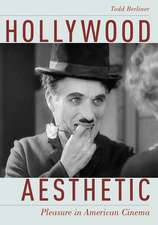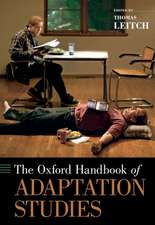Roland Barthes' Cinema
Autor Philip Watts Editat de Dudley Andrew, Yves Citton, Vincent Debaene, Sam Di Iorioen Limba Engleză Paperback – 14 apr 2016
| Toate formatele și edițiile | Preț | Express |
|---|---|---|
| Paperback (1) | 246.25 lei 11-16 zile | |
| Oxford University Press – 14 apr 2016 | 246.25 lei 11-16 zile | |
| Hardback (1) | 814.99 lei 32-37 zile | |
| Oxford University Press – 14 apr 2016 | 814.99 lei 32-37 zile |
Preț: 246.25 lei
Preț vechi: 287.50 lei
-14% Nou
Puncte Express: 369
Preț estimativ în valută:
47.12€ • 50.39$ • 39.29£
47.12€ • 50.39$ • 39.29£
Carte disponibilă
Livrare economică 17-22 martie
Preluare comenzi: 021 569.72.76
Specificații
ISBN-13: 9780190277550
ISBN-10: 0190277556
Pagini: 216
Ilustrații: 9 illus.
Dimensiuni: 137 x 206 x 13 mm
Greutate: 0.24 kg
Editura: Oxford University Press
Colecția OUP USA
Locul publicării:New York, United States
ISBN-10: 0190277556
Pagini: 216
Ilustrații: 9 illus.
Dimensiuni: 137 x 206 x 13 mm
Greutate: 0.24 kg
Editura: Oxford University Press
Colecția OUP USA
Locul publicării:New York, United States
Recenzii
this is a rich and nuanced intervention which changes how we see Roland Barthes and film.
Philip Watts' probing of Barthes' advance-retreat relationship to the movies is wise, sensitive and stimulating-in fact, brilliant. Even rarer is the warmth, clarity and goodwill he expresses toward the often antagonistic figures who championed French theory. The addition of several previously unavailable pieces by Barthes makes this an irresistible volume.
Philip Watts' ground breaking work on Roland Barthes and cinema is a gift to film studies, to literary studies, and to theory. No other critic could match Watts in combining close textual analysis with historical insight. His encounter with Barthes' resistance to cinema shows a deep and refined critical vision, leavened by wit that Barthes would have appreciated.
Watts saw another Barthes besides the semiologist, the structuralist, the demystifier and the Brechtian Barthes, a Barthes who had always been in love with the image and with a particular aesthetics of daily life....
[A] thoughtful bookWatts approach uncovers unexpected riches in what have seemed to be minor moments in Barthes work. The book has chapters on film and myth, on film and perception, on Barthes and Bazin, on film and utopian politics, on film theory, on melodrama Roland Barthes Cinema also includes new translations (by Deborah Glassman) of nine of Barthes less well-known articles on film. s
Philip Watts' probing of Barthes' advance-retreat relationship to the movies is wise, sensitive and stimulating-in fact, brilliant. Even rarer is the warmth, clarity and goodwill he expresses toward the often antagonistic figures who championed French theory. The addition of several previously unavailable pieces by Barthes makes this an irresistible volume.
Philip Watts' ground breaking work on Roland Barthes and cinema is a gift to film studies, to literary studies, and to theory. No other critic could match Watts in combining close textual analysis with historical insight. His encounter with Barthes' resistance to cinema shows a deep and refined critical vision, leavened by wit that Barthes would have appreciated.
Watts saw another Barthes besides the semiologist, the structuralist, the demystifier and the Brechtian Barthes, a Barthes who had always been in love with the image and with a particular aesthetics of daily life....
[A] thoughtful bookWatts approach uncovers unexpected riches in what have seemed to be minor moments in Barthes work. The book has chapters on film and myth, on film and perception, on Barthes and Bazin, on film and utopian politics, on film theory, on melodrama Roland Barthes Cinema also includes new translations (by Deborah Glassman) of nine of Barthes less well-known articles on film. s
Notă biografică
Philip Watts was Professor of French at Columbia University and Chair of the department from 2008 to 2012. A specialist of twentieth-century French literature and film, he is the author of Allegories of the Purge: How Literature Responded to the Postwar Trials of Writers and Intellectuals in France and co-editor of Jacques Rancière: History, Politics, Aesthetics.











